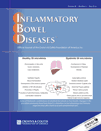Genome-wide methylation profiling in Crohn's disease identifies altered epigenetic regulation of key host defense mechanisms including the Th17 pathway†
P.H. and the pediatric IBD work were supported by a Medical Research Council grant for the PICTS patient cohort (project grant number G0800675). N.A.K. is supported by grants from the Chief Scientist Office (ETM/75) and the charity Cure Crohn's Colitis.
Abstract
Background:
Germline variation in the 71 Crohn's disease (CD) loci implicated by genome-wide association studies (GWAS) only accounts for approximately 25% of estimated heritability. The contribution of epigenetic alterations to disease pathogenesis is emerging as a research priority.
Materials and Methods:
The methylation status of 27,578 CpG sites across the genome was analyzed using the Illumina Human Methylation27 assay in DNA extracted from whole blood samples from 40 adult females (21 ileal CD, 19 healthy controls) and 16 girls with childhood-onset CD, all nonsmokers. Our primary analysis compared methylation profiles in adult cases and controls.
Results:
Our data define a global methylation profile characteristic of ileal CD. In all, 1117 sites were differentially methylated (corrected P < 0.01); 50 showed significantly altered methylation in cases compared with controls (uncorrected P < 10−6, corrected P < 0.0006), including genes altering immune activation: MAPK13, FASLG, PRF1, S100A13, RIPK3, and IL-21R. Gene ontology analyses implicated immunity-related pathways as targets of epigenetic modification (immune system processes [P = 1.3 × 10−22], immune response [P = 8.1 × 10−16], defense responses to bacteria [P = 1.8 × 10−15]). Ingenuity canonical pathway analyses implicated dendritic cell activity (P = 2.4 × 10−8) and differential regulation of cytokines by interleukin (IL)-17A and IL-17F (P = 5.8 × 10−7). We identified a significant enrichment of methylation changes within 50 kb of CD GWAS loci (8.6-fold [P = 0.021] in adults; 2.4-fold [P = 0.009] in adults and children combined), including IL-27, IL-19, TNF, MST1, and NOD2. Methylation status was predictive of disease status (sensitivity 0.71, specificity 0.83). Disease activity, drug therapy, NOD2 and DNMT3A genotypes were not associated with methylation changes.
Conclusions:
These data provide an important insight into the impact of epigenetic mechanisms in the pathogenesis of CD. (Inflamm Bowel Dis 2011;)




